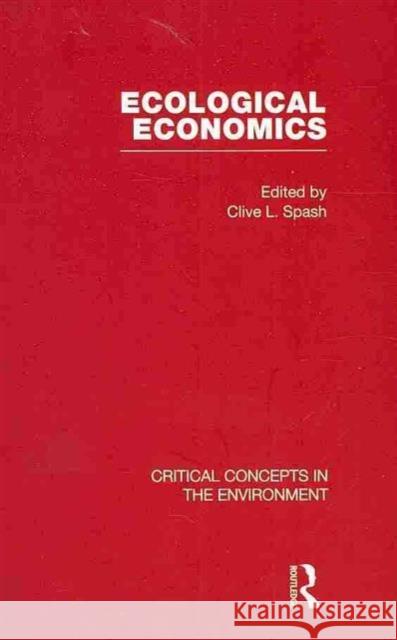Ecological Economics » książka
Ecological Economics
ISBN-13: 9780415431453 / Twarda / 2009 / 2080 str.
A new Routledge Major Work, this is a four-volume collection of canonical and cutting-edge research in the field of ecological economics.
Edited by a leading scholar in the field, this new four-volume Routledge Major Work brings together canonical and cutting-edge research in Ecological Economics. In tracing both the development of thought in the field, as well as exploring the most recent scholarship, diverse elements of the rapidly expanding literature are brought together for the first time, providing an overview of—and vision for—Ecological Economics.
While the roots of Ecological Economics can be traced back to the late 1800s the modern movement developed from diverse writings in the following century. The field became fully established and institutionalized in the late 1980s. This collection shows how research questioning the basis of mainstream economics combined with a concern for environmental degradation and limits to growth to produce Ecological Economics. There are also many academics who, while not calling themselves ecological economists, have ideas which are directly of relevance. The common interest, as shown in Parts I–III of the collection, has been to move beyond standard economic approaches and towards a new political economy which takes note of learning in other sciences.
The collection identifies the key areas where socio-economics has interacted with other disciplines to produce Ecological Economics. This interaction involves rethinking the extant mechanistic modelling approach adopted by economists in the late 1800s and reflection on the insights of biological and ecological methodology, such as evolutionary theory. In Parts IV and V the importance of physical laws for economic theories of growth, production and technical change are explored. This leads into the area of limits to growth and the more recent literature on sustainable development. Part of the debate about sustainable development shows how important formal and informal institutions are for explaining the continuation of environmental degradation and likewise in offering options for a new future.
Part VI focuses on institutional analysis and resource use. Two other areas arising from the concern for sustainable development and environmental management are also addressed in Parts VII and VIII, namely uncertainty and future generations. Parts IX and X pick up on the theme of environmental values and their expression showing the pluralistic and interdisciplinary understanding required to progress policy in this area. Environmental ethics is given specific attention in Part X.
A standard criticism levelled against critics of mainstream economics is that even if their arguments are true they offer no valid alternatives. Parts XI–XIII demonstrate that a diverse range of new approaches are being developed for policy analysis and that specific tools are also being put into practice. Such tools relate to the concerns explored in the preceding volumes.
Besides identifying and collecting seminal works in the field, the editor has also chosen certain pieces for their ability cogently to summarize and explain developments and ongoing thinking. Ecological Economics is now a vibrant and dynamic field, but it has to date lacked a coherent guide to its rapidly expanding literature. Aided by the collection’s thematic organization and the editor’s newly written Introduction, this Major Work will enable users to make sense of the wide range of approaches, theories, and concepts that have informed research in Ecological Economics to date. It is an essential collection destined to be valued as a vital research resource by all scholars and students of the subject.











